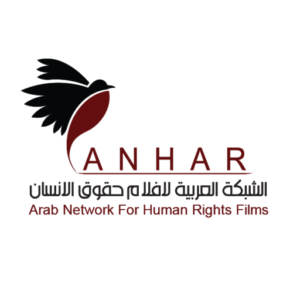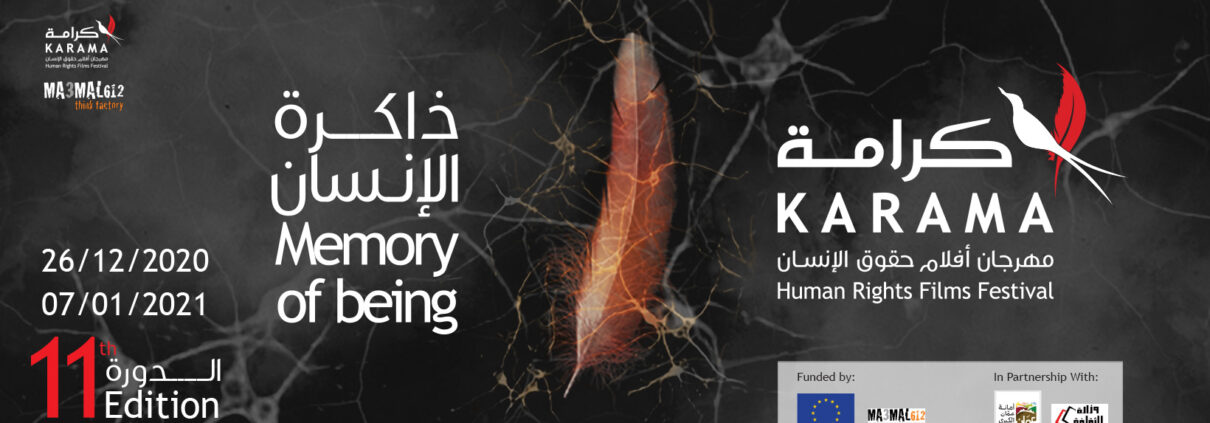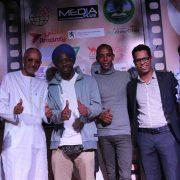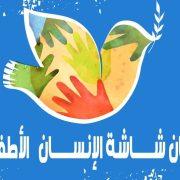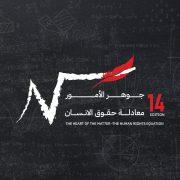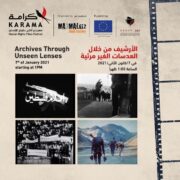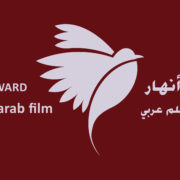Karama Human Rights Film Festival 11th Edition
Karama Human Rights Film Festival Successfully Concludes its 11th Edition and Announces the Winning Films
Amman – January
Karama Human Rights Film Festival, the international festival that is the first of its kind, concludes its 11th edition after two successful weeks of screening to a set of top-rated films under the theme “Memory of Being”. Most of the screenings exceptionally took place on the virtual platform in response to the current pandemic situation, whereby theatre screenings were restricted to selected activities with a limited audience. Forty films were successfully screened, along with parallel events such as film discussions, debates, seminars and workshops such as MusiKarama, Karama Children, and Karama Irbid. Karama closing ceremony of the festival took place on Thursday, January 7th, at the Royal Cultural Center, and in the presence of a very limited audience.
The closing ceremony included a welcome note from the Director of Karama Human Rights Film Festival, Ms. Sawsan Darwaza, who thanked all partners and supporters as well as the team behind this success. Ms. Darwaza also expressed her appreciation to the Karama HRFF audience and fans who were enthusiastic about the festival ever since its inception. Mr. Ihab Khatib, the Artistic Director of Karama HRFF, also recalled the very beginning of Karam Festival in 2010 and praised the neighborhood open-air screenings on the walls that were exclusively introduced this year.
The winning films for the “Karama Feather Award” were also announced and acknowledged during the closing ceremony. The films fall under the following 4 categories: 8 films were nominated for “Karama Feather Award for Best Documentary Film” and was awarded to “The Art of Dissent” by American director James Le Sueur; and highlights the Czech cultural movement during the Velvet Revolution. Four films were nominated for the “Karama Feather Award for Best Fiction Film” and was awarded to “All This Victory” by the Lebanese director Ahmad Ghossein. 11 films were nominated for the “Karama Feather Award for Best Short Fiction Film” and was awarded to “Gabriel” for the director Yousef Kargar. Five films were nominated for the “Karama Feather Award for Best Animation Film” and was awarded to Director “Mahsa Sammani”. Five films were nominated for the ANHAR Award; “Best Human Rights Film of the Year” by the Arab Film Network and was awarded to the Palestinian film “200 Meters”, directed by Ameen Nayfeh and produced by Odeh for Film Productions for tackling a valuable human rights subject as well as the Palestinian cause. The “Audience Award”, which is selected based on the audience’s votes, was awarded to “As You Can See” by the Egyptian director Ghada Fekri.
The juries were selective when choosing the winners due to the high competition between a range of creative films, where experts joined the following 4 juries: the Documentary Jury was comprised of the Egyptian writer and filmmaker Khaled Ezzat, the Moroccan director Ali El Safi, and the German documentary director Monica Maurer. The Animation Jury was comprised of the Bulgarian painter and director Boris Despodov, the Indian illustrator and filmmaker Debjani Mukherjee, and Dr. Nabil Al-Metaini from Egypt. The Fiction Jury was comprised of Maciej Nowicki from Poland – director of WATCH DOCS, the Moroccan director Abdelilah ElJaouhary, and the Jordanian writer Yasser Qubeilat. The Short Film Jury was comprised of Tareq Abu-Lughod – the Founder and Owner of Arab Media Network, Cynthia Choucair – the film director from Beirut DC, and Dr. Alexandra Colta – the Scottish producer specialist at the Human Rights Film Festival.
Just like every year, the closing of the festival acknowledges one of the cinema artists or actors who passed away but left valuable films and exceptional impact, under the acknowledgment of “The Empty Chair”. This year, Syrian director and actor Hatem Ali has been selected for this edition, due to the treasured and appreciated films and series he created, most notably “Al Taghreebah Al Falestiniah”. Hatem Ali has previously participated in Karama HRFF and showcased his film “The Long Night” in 2010.
One of the most important parallel events was the “Unseen Lenses” seminar, that came in partnership with the Arab Film Network for Human Rights Films “ANHAR”, aiming to discuss the importance of establishing a Palestinian Archive center and the value of documentation for history. The seminar introduced significant speakers who have valuable input on this matter and have previously established their own archives, including the Cinema Director Qassem Hawal, Dr. Fayha Abdel Hadi and directors Muhannad Yacoubi and Ayed Nabaa.
On this occasion, Director of Karama Human Rights Film Festival, Ms. Sawsan Darwaza, expressed: “We are filled with pride to conclude another successful edition of Karama HRFF, in an exceptional form, as all circumstances that surrounded the world did not stop us from continuing what we started years ago, and we were glad to conduct our parallel events using the latest technology on live virtual platforms, the most important of which was the closing conference for “Cinema in Education”, along with the launch of a gender-sensitive curriculum book for cinema students, in partnership with UNESCO.”
Speaking about the films selected in this edition, Ihab Khatib, the Artistic Director of Karama HRFF expressed: “We are very selective when curating Karama films as we are committed to presenting the best. We believe in the vital role that cinema plays to create a positive impact and deliver effective messages. We are proud of this edition’s experience by screening on the virtual platform that proved to be successful and interactive. We gladly noticed an obvious number of audiences who attended from all over the world, reaching to more than 5,000 viewers. We kept some of our activities to take place physically at theaters; and it is important to mention the youth forum entitled “Reflections-19” that came up with 7 short films highlighting the topic of “the city and COVID-19.”
Karama HRFF has gained immense popularity and admiration since its inception, the 11th edition has introduced a plethora of innovative activities such as open-air screenings on Amman’s walls, serving as nostalgic recall of the old ways of cinema.
It is worth noting that Karama HRFF is managed and organized by Ma3mal 612 Think Factory and is in partnership with the Ministry of Culture, funded by the European Union and supported by the International Media Support (IMS). Karama HRFF aims to shed light on human rights issues and spread debate and discussion, especially during these times of COVID-19 the world is currently facing.
-
The End –
